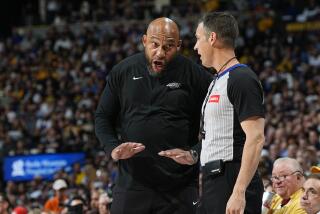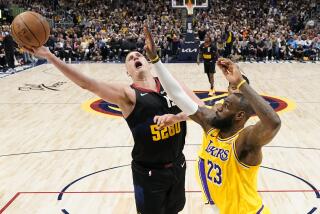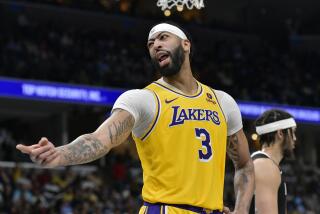City Section Rejects Kennedy Video Protest
- Share via
City Section Commissioner Hal Harkness does not really know what to tell those who keep pestering him about the Kennedy-Fairfax videotape incident.
Harkness returned from a four-day school district vacation to find his phone-answering machine loaded with calls and a mini-cam crew from KNBC-TV at his office to interview him. Television coverage of high school sports, of course, is not his favorite subject right now.
“They didn’t say when it would air. I hope it’s late at night. It’ll probably make the Hall of Shame,” he said, referring to a local sportscaster’s TV segment.
As far as Harkness is concerned, inquiries into the matter--in which officials used a videotaped replay to change a game-tying, three-point basket in the game’s final seconds to a two-point basket and a 32-31 Kennedy loss--are useless.
Kennedy’s protest, delivered Tuesday morning, never had a chance.
“It’s history,” Harkness said. “There’s no mechanism in the rule book regarding a protest in basketball under any circumstances. The kids will suffer for it and we’re sorry, certainly, but that’s the best we can do.”
Trailing, 32-29, Kennedy guard Cord Bailey made an apparent three-point shot with less than 10 seconds remaining. The official at the top of the key ruled it a three-point shot and the points were posted. Fairfax inbounded the ball, and thinking the score was tied, took a last-second shot.
Harkness said the officials realized they disagreed on the placement of Bailey’s feet after the game ended. The officials were correct in waiting until the clock stopped to confer, he said, since Fairfax had immediately inbounded the ball after Bailey’s shot.
“On a correctable error, the referees should wait until the first dead ball to discuss it,” Harkness said. “They have the right to alter the score. Using a TV to alter the score is incorrect.”
The game, played at Fairfax, was broadcast by a local cable TV company. Kennedy Coach Yutaka Shimizu said that after officials discussed how many points Bailey’s shot was worth, they approached the broadcasters and viewed the videotaped replay.
Shimizu said he never watched the replay and that the location of Bailey’s feet are not his main concern. National High School Federation policy prohibits use of television replays in aiding officials, and Shimizu said he wants to ensure that the snafu does not happen again.
“I think the referees have to be talked to, otherwise this is going to happen to some other coach in the same situation,” Shimizu said. “Some other poor guy is going to get screwed just like we did.”
Shimizu said the delayed call cost the team more than one point. Since Bailey’s basket was made with seven seconds left, Kennedy could have tried different tactics to regain the ball or stop the clock--had the Golden Cougars known they actually were trailing.
“We could have fouled, tried to get a five-second call on the inbounds pass and called time out,” Shimizu said. “When I realized what they were doing, I went over and asked for my six seconds back. We would have still had a decent chance.”
Kennedy had clinched third place in the Valley League before the game was played, so the decision did not affect the Golden Cougars in the standings. Had Kennedy won an overtime contest, however, it would have knocked Fairfax out of a tie for first with Cleveland at 10-1.
Logistically, Kennedy would have had a difficult time fitting a replay into its schedule. Monday was a holiday and the Golden Cougars play Hamilton today and begin the playoffs Friday.
“We really didn’t have anything to gain, psychologically or physically,” Shimizu said. “My main concern is that they handled everything so poorly.”
Harkness said no reprimands would be given to the officials, Al Rambo and Garfield Findley, whom he called “two of the most experienced refs we have.” Harkness said the use of TV replays would be addressed at a meeting of officials before next season.
“They acted on good faith,” he said. “Referees can make a decision on situations not covered in the rule book, and that’s what they did.”
A Federation policy prohibits the use of video replays, but it is not specifically mention ed in the rules section. Harkness said the only sports that are allowed protests are baseball and softball.
Harkness said he expected something like this to happen when the three-point shot was adopted before this season.
“We suspected it might cause some problems,” he said.
More to Read
Sign up for Essential California
The most important California stories and recommendations in your inbox every morning.
You may occasionally receive promotional content from the Los Angeles Times.













